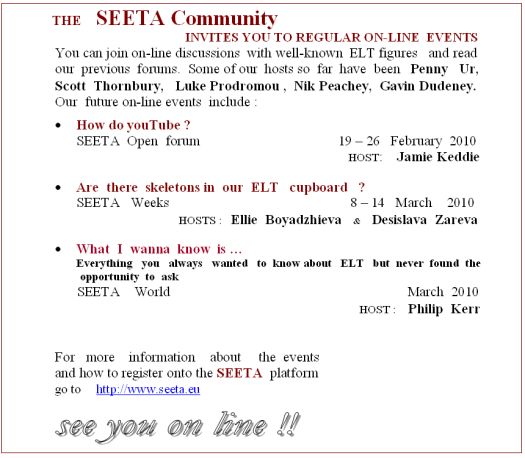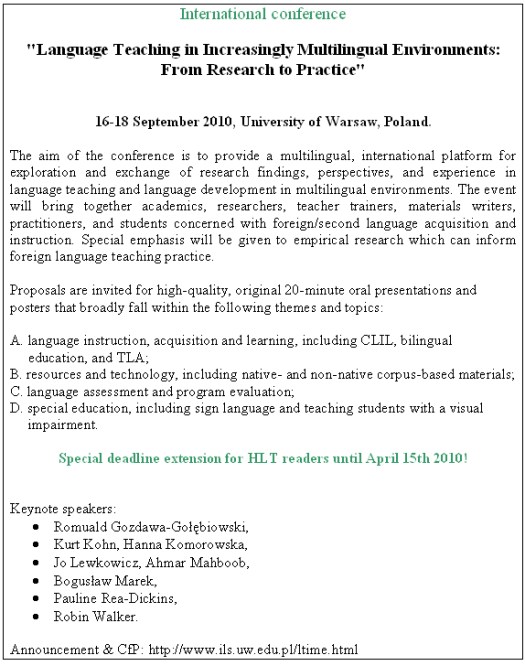Dear HLT Readers,
Welcome to the new issue of HLT, I am writing this editorial in the midst of winter looking at snowdrifts and steel coloured Baltic Sea. And yet this issue is as usual full of warmth and humanism.
This time I will start with some HLT news. In this issue we can announce the winner of the HLT scholarship. Soon I hope D. Ravi Kumar will make a contribution to HLT.


I hope you have had a chance to apply for an EU grant and that we will be able to welcome you at Pilgrims at Easter and/or in the summer. In 2010 April Courses Mario Rinvolucri shares with you his impressions from the Easter courses he has experienced and compares them to the summer ones. In her article Back Home: Using NLP in the Classroom, Bonnie Tsai, a Pilgrims trainer, shares with you an example how NLP courses inspire the teachers who attend them.
There is another new development. For the first time a Pilgrims trainer has taken part in a video conference. Mario Rinvolucri was in the UK talking to teachers in Mexico. You can read about it in Impressions on Mario’s Video Conference and watch the conference itself on the Pilgrims facebook site. I would also like to thank you for your e-mails. You can read about a variety of interesting issues raised by their authors in the Letters section.
In this issue you will find a number of articles on pronunciation: major article Pronunciation and Motivation in FLT: An Empirical Classroom Study Among Flemish Learners of German by Philipp Bekaert, and The Arts and Crafts of Teaching Pronunciation: The What and How? , by Hande Isil Mengu. Additionally, in his article English Pronunciation in Use Elementary, Jonathan Marks reviews the book he has published recently. This auto-review is very sincere and genuine. It also offers additional insight into the book.

You will find some more on recent publications in Exploring TESOL Practices in the Arabian Gulf, by Neil McBeath and in Short Book Reviews where two books are reviewed: ‘English for Law Enforcement’ and ‘Vocabulary Matrix’. The last title will be of interest to those into the Lexical Approach, who will certainly also enjoy reading Revisiting ‘My Good-bye to the Lexical Approach’ by Seth Lindstromberg. There is also a glimpse of Martin Wolff’s new book in Of the Students, By the Students and For the Students: Chapter 5 - First Day Student Culture Shock.
A number of articles look at language teaching across the globe. In their major article China EFL: Mute English. CET – the Bane of EFL Acquisition in China, Niu Qiang, PhD and Martin Wolff look at ‘mute English’. This new term describes a phenomenon when students know English passively very well, while they cannot speak it. You can read about the world of publishing in China in Made in China by Simon Greenall, while Graham Paterson takes us to Indonesia in An Indonesian Assignment. In his major article Current Trends in Teacher Performance Evaluation in Portugal Carlos Ceia looks at the Portugese ELT scene.
Humanism and creativity are represented in this issue by a number of articles: How to Present Vocabulary in a Language Classroom in a Communicative Way by Adriana Pčolinská, Yoga and Learning English: Being Here Now by Ana Maria Ferreira Barcelos, Creative Language Learning by Roy Boardman

As usual there are many practical, inspiring and original ideas for English lessons: Talking Together: Working Towards Better Group Work by Jessica Watson, Activities for April Fool’s Day by Peter Clements, Swimming Dictation by Catherine Vaucher, Drink, Drugs and Knives: How They Help me Teach English by Liz Plampton, Proverbs and Sayings in the Lesson by Eva Homolová, The ESOL Core Curriculum: De-humanising Language teaching? - Painting by Numbers by Nick Bilbrough, and Successful ABC Exerecise by Annette Kurz.
Humour is very important in our lives and in the classroom. In Speech Errors and Joke Construction in the Routine Language Teaching Giampaolo Poletto looks at the world of mistakes, and at ways of dealing with students errors with a light-hearted and humourous touch. The author advocates a very humanistic and memorable way of approaching this very important issue. I am sure Martin Wolff will entertain you with his article: You Know You Have Been in China For Too Long When … - Substitute Teaching and the Western Culture
For your entertainment there are also Two Jokes, submitted by Cecile Marit, Two Five Year Old Voices on teaching submitted by Mario Rinvolucri, two stories with a message: The Duty of a Best Friend by Ken Jackson and The Carpenter by Henk Van Oort, and finally, a poem DOT by Paul Bress.
As you can see for those into CLIL there is also a call for contributions and invitation to cooperate.

Enjoy the issue
Hania Kryszewska
hania.kryszewska@pilgrims.co.uk



|